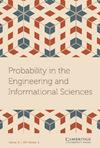自然资源的最优管理和估价:最优收获的案例
IF 1
3区 工程技术
Q4 ENGINEERING, INDUSTRIAL
Probability in the Engineering and Informational Sciences
Pub Date : 2022-03-11
DOI:10.1017/s0269964822000043
引用次数: 0
摘要
在本文中,我们考虑可持续收获的问题。我们解释了管理者如何根据采伐区域的可用自然资源数量,并在超过配额时的处罚和罚款约束下实现利润最大化。我们用一个验证结果来描述最优值和一些最优策略。然后通过数值例子证明了这种最优策略优于朴素策略。此外,我们定义了一个罚款水平,以确保可持续收获的双重目标:可用自然资源的剩余数量,以确保其可持续性,并为管理者提供可接受的收入。本文章由计算机程序翻译,如有差异,请以英文原文为准。
Optimal management and valuation of a natural resource: the case of optimal harvesting
In this paper, we consider the problem of sustainable harvesting. We explain how the manager maximizes his/her profit according to the quantity of natural resource available in a harvesting area and under the constraint of penalties and fines when the quota is exceeded. We characterize the optimal values and some optimal strategies using a verification result. We then show by numerical examples that this optimal strategy is better than naive ones. Moreover, we define a level of fines which insures the double objective of the sustainable harvesting: a remaining quantity of available natural resource to insure its sustainability and an acceptable income for the manager.
求助全文
通过发布文献求助,成功后即可免费获取论文全文。
去求助
来源期刊
CiteScore
2.20
自引率
18.20%
发文量
45
审稿时长
>12 weeks
期刊介绍:
The primary focus of the journal is on stochastic modelling in the physical and engineering sciences, with particular emphasis on queueing theory, reliability theory, inventory theory, simulation, mathematical finance and probabilistic networks and graphs. Papers on analytic properties and related disciplines are also considered, as well as more general papers on applied and computational probability, if appropriate. Readers include academics working in statistics, operations research, computer science, engineering, management science and physical sciences as well as industrial practitioners engaged in telecommunications, computer science, financial engineering, operations research and management science.

 求助内容:
求助内容: 应助结果提醒方式:
应助结果提醒方式:


